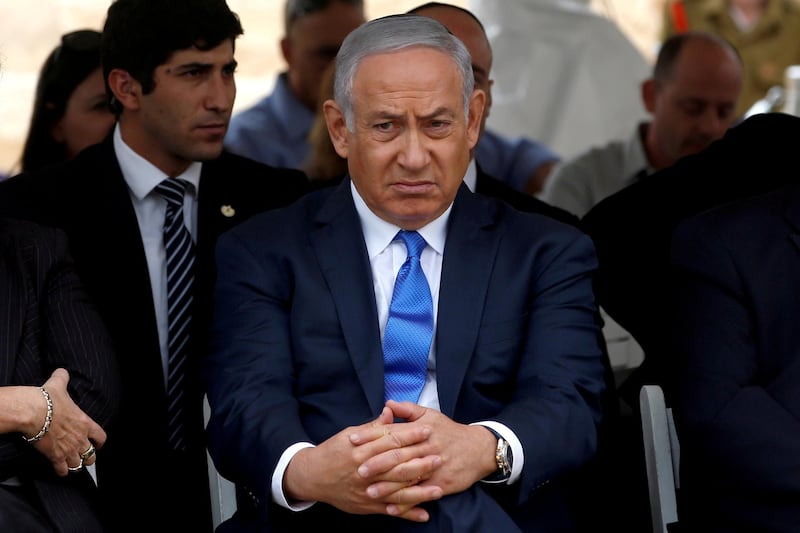Israeli Prime Minister Benjamin Netanyahu fought to save his tottering government after his defense minister’s resignation, pinning his hopes on a crucial meeting Sunday with a wavering coalition ally.
Mr Netanyahu is set to meet with Finance Minister Moshe Kahlon, who has urged the prime minister to go for early elections after Defence Minister Avigdor Liberman's departure last week left the government in control of just 61 out of 120 parliamentary seats.
It’s not possible to govern with such a narrow coalition, which will be subject to constant pressures from its partners, Mr Kahlon said in an interview on Saturday on Hadashot News. Still, he said he would keep an open mind for Sunday’s meeting with Mr Netanyahu.
“Maybe he’ll pull a rabbit out of his hat,” Mr Kahlon said. “Although for a long time it seems there has been no rabbit and no hat.”
The coalition was thrown into turmoil when Mr Liberman resigned and pulled his Yisrael Beitenu party's five legislators out of the government, saying Prime Minister Netanyahu wasn't responding forcefully enough to rockets fired into Israel by Palestinian militants in Gaza.
Education Minister Naftali Bennett, who also urges a harsher line on Gaza, demanded the defence portfolio after Mr Liberman left. In a meeting on Friday, Mr Netanyahu said he would keep the defence portfolio for himself for now, according to a statement from Mr Netanyahu's office.
_______________
Read more:
Israel's Netanyahu to hold 'decisive' meeting on coalition
Electoral pressure may push Israel into new Gaza attack, analysts say
Pressure builds on Benjamin Netanyahu to call early elections
Israeli elections seem likely after Lieberman's resignation
_______________
Speaking on Israel's Meet the Press on Saturday, Mr Bennett said he and Prime Minister Netanyahu had agreed the government could not survive and early elections would have to be called. A spokesman for the prime minister said no such decision had been taken and the government should serve out its final year. Elections are slated for November 2019.
“There’s no reason to go to elections,” the spokesman said in a statement. “A right-wing government shouldn’t be toppled.”
If elections are indeed moved up, the current government, formed in 2015, would be the last in a long line of coalitions to fall apart before their terms expired. Israeli commentators predicted elections would be advanced to March.
They’re not expected to produce a significantly changed parliament, however. According to a Hadashot News poll on Saturday, Mr Netanyahu’s Likud would remain the dominant party, with its representation stable at 30 seats; Mr Bennett’s Jewish Home party would rise slightly to 10 seats and Mr Kahlon’s Kulanu would fall from 10 to eight. They both said they expect elections to produce another conservative government under Mr Netanyahu.
Why Early Election Could Be Just What Netanyahu Needs: QuickTake
Such calculations have proven wrong in the past once the election genie is out of the bottle. In 1992 hardliners toppled a Likud-led government, expecting to further strengthen their hold; instead, the Labor Party swept to power under Yitzhak Rabin and went on to sign the Oslo peace accords with the Palestinians.
Labor’s current leader, Avi Gabbay, said he’d be glad if elections were called - "the earlier, the better.” Polls show the Zionist Union faction, which includes Labor, falling from 24 seats to just 12 if elections were held today.
"The public has to choose between the Likud, which tells the public they should be grateful for the way things are, and us, who are promoting a change for the better," Mr Gabbay said at a public event on Saturday.
There have been months of speculation about whether Prime Minister Netanyahu would disband an unruly government and seek a popular mandate with corruption allegations hanging over his head.
A two-year-old probe against the prime minister is inching toward a conclusion, with Attorney General Avihai Mandelblit due to decide whether to indict him in multiple cases. Some commentators have reasoned that if the prime minister goes to early elections and wins big, Mr Mandelblit might hesitate to take action against him.
Prime Minister Netanyahu has denied wrongdoing in the cases against him, contending he’s the victim of a leftist cabal that wants to bring down his conservative government. He’s now also facing criticism from residents of southern Israel, who feel the government has not done enough to neutralize rocket fire and other threats from the Gaza Strip.





